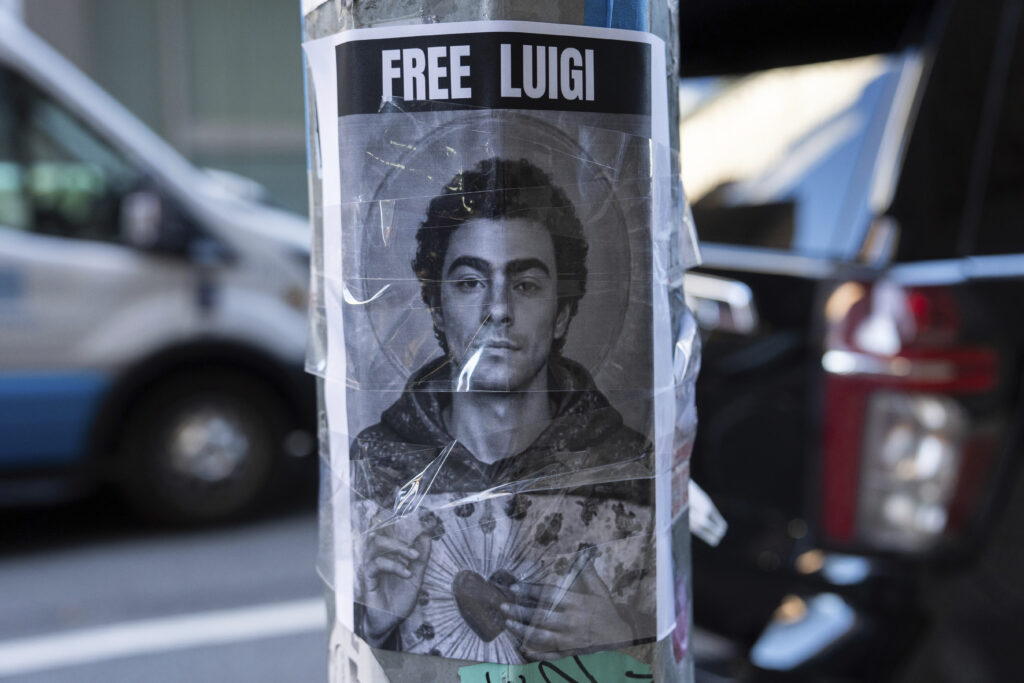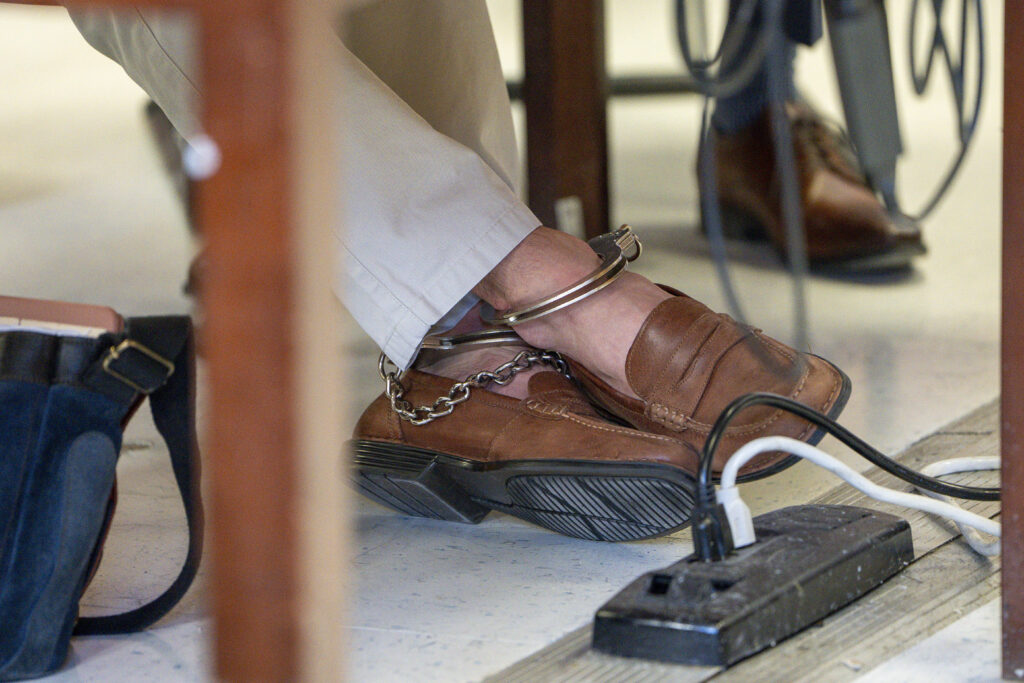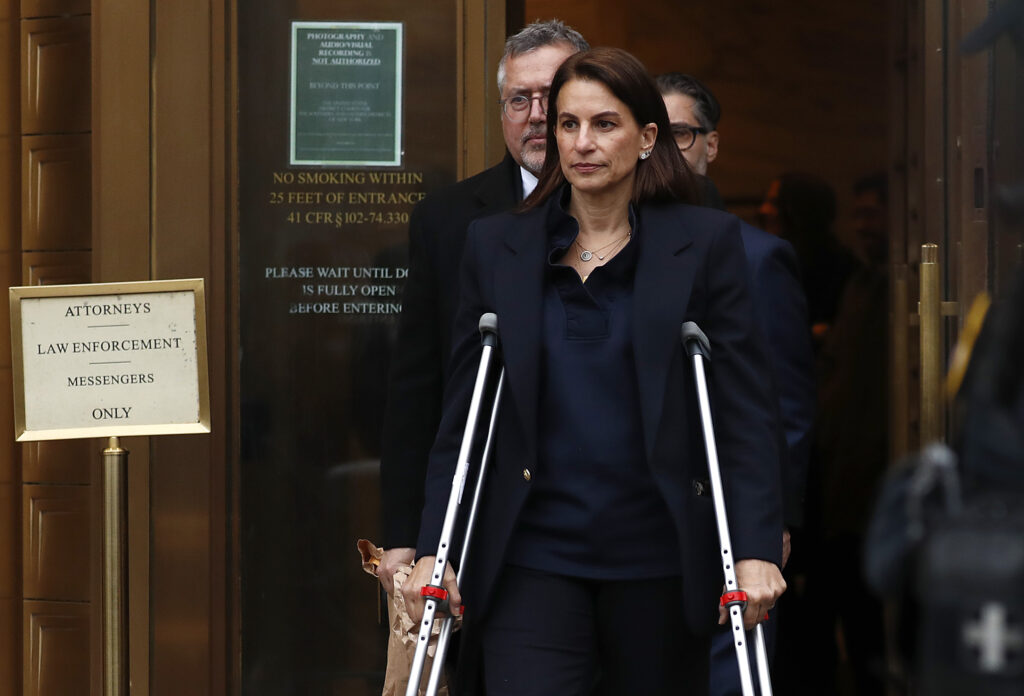The 26-year-old Ivy League graduate charged with gunning down UnitedHealthcare CEO Brian Thompson on a street in midtown Manhattan, Luigi Mangione, has been granted permission to review the evidence in his ongoing cases on a specially configured laptop at the notorious jail in Brooklyn, where he is currently being held, a judge ordered on Thursday. Court filings also revealed that witnesses have already received threats even though Mr. Mangione’s trials are still months away.
New York Supreme Court Justice Gregory Carro, who presides over Mr. Mangione’s state case (he’s also been charged by the federal government), granted the defense a request to provide its client with a custom laptop to view the evidence, which is referred to as “discovery” in the pre-trial stage. “The court has no objection to the defendant being provided with a laptop computer to view discovery if the federal authorities permit it,” the judge’s order stated. Mr. Mangione’s place of incarceration, the Metropolitan Detention Center Brooklyn, is administered by the Federal Bureau of Prisons.
Mr. Mangione faces three separate indictments in three jurisdictions for allegedly gunning down Mr. Thompson, a Minnesota father of two who was the CEO of UnitedHealthcare, last December on a Midtown sidewalk, in front of the New York Hilton, as the executive was on his way to an investor conference. Mr. Thompson was pronounced dead at the hospital half an hour after the shooting. Mr. Mangione allegedly fled the scene and left New York the same day.
After a five-day manhunt, during which surveillance pictures of the alleged assassin were circulated on national media and flooded the internet, Mr. Mangione was arrested at a McDonald’s in Altoona, Pennsylvania, where an employee called the police after a customer had recognized the young man, who had removed his face mask to eat.
According to police reports, Mr. Mangione carried a 9-millimeter 3D-printed handgun, two ammunition magazines, multiple live cartridges, a homemade silencer, and a fake New Jersey drivers license, which he is believed to have used to check into the hostel in Manhattan’s Bloomingdale neighborhood where he stayed before he murdered the executive.

The suspect was extradited to New York in late December. Besides facing gun possession and other charges in Pennsylvania, Mr. Mangione is being prosecuted for murder in New York both in federal and in state court. He has pleaded not guilty to all charges.
The top federal charge is death penalty eligible. The state case, which carries a maximum of life in prison, was brought by Manhattan district attorney Alvin Bragg. Federal and state prosecutors agreed that Mr. Bragg’s case would go to trial first.
However, because the defendant is being held in a federal jail, any request regarding his detention has to be approved by both state and federal prosecutors.
On March 21, Mr. Mangione’s defense attorneys filed a motion asking the state judge that their client be given “a specially configured laptop” to review the voluminous amount of evidence stating that “federal prosecutors in the first instance” did not “object to this reasonable request.”
But prosecutors from the district attorney’s office did object. In an email sent to defense attorneys, which they cited in their motion, prosecutors raised the concern that should Mr. Mangione be able to review the evidence, witnesses could receive threats. They argued that “the sensitive nature of many of the documents and the threats that several witnesses have already received,” was a reason not to consent “to a personal laptop at this time.”

Mr. Mangione’s lead defense attorney, Karen Friedman Agnifilo, pushed back. In her motion, she argued that Mr. Mangione cannot possibly be involved with any such threats since he has not seen the evidence and does not know the names nor faces of any witnesses.
“Counsel notes that the District Attorney’s Office has no basis to believe that Mr. Mangione has any connection to the alleged witness threats. This is particularly true given that the prosecution has not yet provided counsel with the names of any civilian witnesses or their information. Consequently, to the extent witnesses have received threats, this only shows that the witnesses’ identities are already public, and that Mr. Mangione had no part in disseminating their names,” Ms. Agnifilo wrote.
Her arguments did not impress state prosecutors. Four days later, on March 25, they asked the judge to deny the laptop request, reasoning it would be an “impossibility” to redact all of the video surveillance pertaining to his case and should Mr. Mangione “have unfettered access to video surveillance, he may disseminate images of civilians captured on said video surveillance,” prosecutors wrote. They further argued that a laptop was not necessary because the jail facility offers inmates “ample access to desktop computers.”
According to the website of the Department of Corrections, MDC does not offer inmates direct access to the internet or social media, only access to tablets for communication and entertainment, including a monitored email system. But the facility offers, prosecutors wrote, desktop computers, on which Mr. Mangione could view the electronic files of his evidence.

Ms. Agnifilo pushed back again, arguing in a second letter, sent on March 26, that her client would need to download special players to view the videos, and that the desktop computers at the facility are shared with other inmates.
“Given that these public desktops are shared, coupled with the extremely large amount of discovery in this case, it is not accurate for the District Attorney’s Office to claim that Mr. Mangione has ‘ample’ time to meaningfully review his discovery without a laptop. Furthermore, the thousands of hours of videos can only be viewed through specific video players, some of which need to be specifically loaded onto the reviewing computer,” Ms. Agnifilo argued.
Since the visiting hours between attorneys and inmates are time-limited, she would need to print out about “15,000 pages” of discovery in order for her client to view all the evidence. Thus, without a laptop her client would also lack the privacy to review the massive amounts of documents.
“The prosecution’s position is perplexing; it does not object to Mr. Mangione possessing tens of thousands of loose pages of discovery in his cell where it could be widely seen by other inmates at the MDC,” her letter said.
She further pointed that out that Mr. Mangione was extremely unlikely to harm a witness, having been “nothing but cooperative” and “peaceful” since his detention. She wrote that after he was arrested in Pennsylvania, “among the first words” that came “out of Mr. Mangione’s mouth was an apology and a concern for the very McDonald’s employee who they are saying is now receiving threats.” She quoted a court filing, where Mr. Mangione told officers: “I apologize for the inconvenience of the day… They aren’t going to put the cashier from McDonald’s information out there are they? It wouldn’t be good for her. A lot of people will be upset I was arrested.”

“This is the very opposite of someone who is seeking to terrorize anyone or wishing harm or violence to anyone.” Ms. Agnifilo wrote.
It’s true that Mr. Mangione’s arrest has triggered a sizable outpouring of public support for the alleged killer because of the unpopularity of health insurers such as United Healthcare, not to mention his fetching appearance. An online campaign on GiveSendGo, a faith-based crowdfunding site popular with conservatives that, unlike GoFundMe, will support people charged with violent crimes, has raised $764,517 to cover his legal expenses as of Thursday evening.
The alleged killer even received a love note smuggled to him inside a pair of socks. In their letter asking the judge to deny the laptop privilege, prosecutors complained that two heart-shaped love notes were smuggled to Mr. Mangione inside the cardboard packaging of argyle socks given to him ahead of his court appearance at Manhattan criminal court in February.
Prosecutors wrote that unlike “most incarcerated defendants” who “must wear jail-issued clothing,” when they appear in court, Mr. Mangione was given permission to receive and wear regular clothing – he wore a subtly stylish knit green sweater over a collar shirt with khakis – and somehow, someone was able to sneak a note into his socks.

“Luigi, we are rooting for you! Keep your head held high and know there are thousands of people wishing you luck,” read the note. (Ms. Agnifilo included a picture of it in her letter.) The note was signed “R/Free Luigi,” which could be a reference to a Mangione fan section of the website Reddit.
Prosecutors seemed rather upset that despite being given the privilege to wear “different clothing” to court and after having received the socks, Mr. Mangione decided not to wear them. “The defendant was permitted to wear the argyle socks,” prosecutors wrote, “which he first changed into and later changed out of because he felt that ‘they did not look good.’”
Strangely, Mr. Mangione’s fashion caution turned out to be quite on point. During his appearance at criminal court, one of the pool photographers, Curtis Means, snapped a picture of Mr. Mangione bare, shackled, ankles peeking out from a pair of fancy leather loafers, crossed under the defense table. The picture went viral, adding to Mr. Mangione’s sex appeal.
The socks ordeal is part of a larger discussion regarding the question of whether or not Mr. Mangione is being treated fairly. The defense attorneys complained that they are not allowed to meet with her client “in private either before or after his court appearances, unlike every other similarly situated defendant that comes before this Court.” Meanwhile prosecutors argue that the request for a laptop is part of the defense’s strategy to delay the case, calling it “yet another hollow excuse for delaying their filing of motions on the case.”
Two other high-profile inmates, detained at MDC, were given access to a configured laptop to view the discovery documents in their cases: The fallen crypto king, Sam Bankman-Fried, who was recently moved to a detention center in Oklahoma after he gave an unauthorized interview to Tucker Carlson; and the rapper and music producer Sean “Diddy” Combs, who is charged with racketeering, sex trafficking, and transportation for purposes of prostitution. Mr. Combs is being represented by Ms. Agnifilo’s husband, Marc Agnifilo. His trial is set to begin in early May.
Mr. Bankman-Fried, at one point, received permission to visit the federal courthouse twice a week in the runup to his trial so he could use the Internet to prepare his defense. This was due to the lack of internet service at MDC Brooklyn.
In his Thursday order, Judge Carro granted the laptop access to Mr. Mangione and altered the motion schedule slightly, but not significantly. He kept the next court date, set for June 26, on the court calendar.
Mr.Mangione is also scheduled to appear in federal court for a hearing on April 18.
(Except for the headline, this story has not been edited by PostX News and is published from a syndicated feed.)

